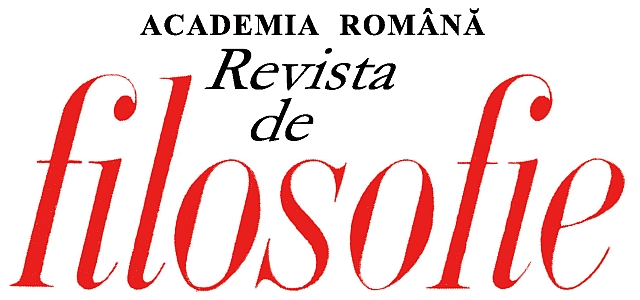FILOSOFIA ROMÂNEASCĂ ÎNTRE 1950 ȘI 1990. DOUĂ LUCRĂRI DIN EPOCA DE TRANZIȚIE
Romanian Philosophy between 1950 and 1990. Two Books published in the Transitionʼs Years
Author(s): Dragoș PopescuSubject(s): History of Philosophy, Contemporary Philosophy, Marxism
Published by: Editura Academiei Române
Keywords: Romanian philosophy; Dialectic Materialism; Ethics; Lucrețiu Pătrășcanu (1900–1954); C. Ionescu-Gulian (1914–2011);
Summary/Abstract: The article presents two early Romanian Marxist-Leninist books, authored by two Romanian representative marxists. Both books were simultaneously published in March 1946, shortly after the occupation of the country by the Soviet Army, as a consequence of Romaniaʼs defeat in the Second World War. Both have a strong programmatic character. The first book, Curente și tendințe în filozofia românească [Streams of Thought and Tendencies in Romanian Philosophy] was written by Lucrețiu Pătrășcanu, at that time Minister of Justice in the newly installed communist Romanian Government. Streams of Thought and Tendencies in Romanian Philosophy strives to put in an unfavorable light the entire Romanian philosophical movement, on the basis of a severe analysis from the standpoint of Dialectical Materialism (which is, for the first time, systematically exposed by a Romanian communist figure), preparing it for the complete subsequent destruction and its replacement by Marxism, in its final Stalinist version. The main thesis of the book is that various Romanian philosophical contributions were poor imitations of obsolete Western philosophical ones, at their turn ready to be rejected and replaced. The second book, entitled Introducere în etica nouă [Introduction to New Ethics], was the first book of C. Ionescu-Gulian, a future prodigious communist figure, in charge of philosophical matters in Romania. The „New Ethics” that Gulian proposed to the public did not exist then, as he admitted. However, it envisages (anticipates) a new type of man: the Soviet man, in which the „New Ethics” buries its roots. Moreover, the „New Ethics” aims at and, at the same time, is obliged to justify the complete elimination of any opponent the new type of man could encounter during his universal affirmation as value creator. The „New Ethics” pays a special attention to the ethical concept of necessity, being also constructed as an ideological tool for an insistent (or: demanding) validation of any aggressive action of new human model as a self-defense action and it represents the first elaboration of Historical Materialism by an Romanian author. As a consequence of the distribution of the two books, the Communist Party acquired a theoretical basis to undertake further actions that led to the complete abolition of Romanian traditional schools of thought.
Journal: Revista de filosofie
- Issue Year: LXVII/2020
- Issue No: 4
- Page Range: 377-406
- Page Count: 30
- Language: Romanian, Moldavian

